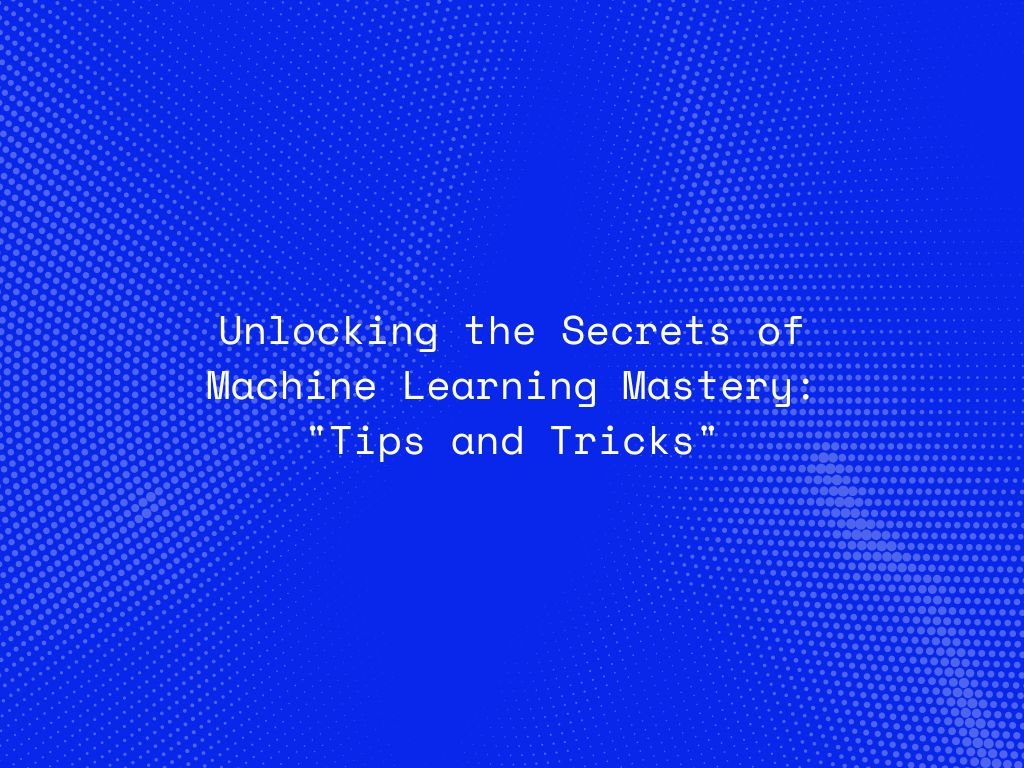Machine Learning (ML) is rapidly becoming one of the most important skills in the tech industry. As data continues to grow in volume and complexity, the ability to harness ML to extract insights and make predictions is invaluable. However, mastering machine learning involves more than just understanding algorithms; it requires practical tips and tricks to navigate its intricacies effectively. In this blog post, we’ll unlock some of the best strategies for achieving machine learning mastery.
Understanding the Fundamentals:
Before diving into advanced techniques, it’s crucial to have a solid understanding of the basics:
-
Data Preprocessing: Properly cleaning and preparing your data is essential. This includes handling missing values, normalizing data, and removing outliers. Quality data is the foundation of any successful ML model.
-
Feature Engineering: Creating meaningful features from raw data can significantly enhance the performance of your model. Look for domain-specific insights that can be translated into features, and don’t underestimate the power of feature selection.
-
Model Selection: Choosing the right algorithm for your problem is critical. Familiarize yourself with different types of models such as linear regression, decision trees, random forests, support vector machines (SVM), and neural networks.
-
Cross-Validation: To ensure that your model generalizes well to unseen data, use cross-validation techniques. K-fold cross-validation is particularly effective in providing a robust estimate of your model’s performance.
-
Hyperparameter Tuning: Optimize your model’s performance by tuning hyperparameters. Techniques such as grid search and random search can help find the best parameters for your model.
-
Ensemble Methods: Combine the predictions of multiple models to improve accuracy. Ensemble methods such as bagging, boosting, and stacking can significantly enhance model performance.
-
Regularization: Prevent overfitting by using regularization techniques like Lasso (L1) and Ridge (L2) regularization. These techniques add a penalty to the model complexity, helping to generalize better on new data.
-
Learning Curves: Use learning curves to diagnose bias-variance trade-offs. By plotting training and validation errors, you can identify whether your model is overfitting or underfitting.
Tricks for Advanced Machine Learning:
-
Feature Scaling: Normalize or standardize your features to ensure that all features contribute equally to the model. Techniques like min-max scaling and standardization can improve convergence speed and model performance.
-
Principal Component Analysis (PCA): Reduce the dimensionality of your data using PCA. This technique helps in removing noise and redundant features, making the model training process faster and more efficient.
-
Data Augmentation: For image and text data, use data augmentation techniques to artificially expand your training dataset. This can help improve the robustness and generalization of your model.
-
Transfer Learning: Leverage pre-trained models for complex tasks such as image and language processing. Transfer learning allows you to build on existing models, saving time and computational resources.
-
Model Interpretability: Use techniques like SHAP (SHapley Additive exPlanations) and LIME (Local Interpretable Model-agnostic Explanations) to understand the predictions of your models. Interpretability is crucial for debugging and improving model performance.
Keeping Up with the Latest Trends:
Machine learning is a fast-evolving field. Stay updated with the latest research papers, attend conferences, and participate in online forums and communities. Websites like arXiv, Kaggle, and Towards Data Science are excellent resources for staying informed about new developments.
Conclusion:
Mastering machine learning requires a blend of theoretical knowledge and practical experience. By focusing on data preprocessing, feature engineering, model selection, and leveraging advanced techniques, you can unlock the full potential of machine learning algorithms. Continual learning and staying updated with the latest trends will ensure you remain at the forefront of this dynamic field.




